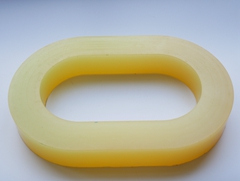Grease resistance of TPU
 Fats refer to vegetable oils and animal fats. As a material
of TPU elastomer, its grease resistance is an important indicator of whether it
can be used in food contact. The resistance of TPU to vegetable oils and animal
fats is discussed here.
Fats refer to vegetable oils and animal fats. As a material
of TPU elastomer, its grease resistance is an important indicator of whether it
can be used in food contact. The resistance of TPU to vegetable oils and animal
fats is discussed here.
(1) The results of vegetable oil resistance show that,
compared with the initial value, the hardness of the two TPUs increased or
decreased after the PET-TPU soaked in vegetable oil. The Shore A hardness of 95
increased by 2%, and the Shore A hardness of 85 decreased by 4%; PVC and
Nitrile rubber has increased, while neoprene and natural rubber have decreased
by 57% and 100%, respectively. Compared with the initial value, the tensile
strength of PET-TPU increased by 57%; PVC also increased, but nitrile rubber,
chloroprene rubber and natural rubber dropped significantly after soaking in
vegetable oil, to 55%, 89% and 99% respectively. It can be seen that TPU is
quite resistant to vegetable oils.
(2) Resistance to animal fat” Table 10-80 shows the
changes in hardness and tensile strength of PET-TPU immersed in animal fat at
70°C×42d, and compared with certain plastics and rubbers. The results showed
that compared with the initial value, after PET-TPU soaked in animal fat, the
Shore A hardness of 95 increased by 1%, and the Shore A hardness of 85
decreased by 7%; PVC and nitrile rubber also increased, while neoprene and
natural rubber Rubber dropped by 70% and 100%, respectively. Compared with the
initial value, the tensile strength of the two hardnesses of PET-TPU increased
by 27% and 40%, respectively; PVC increased by 23%, while nitrile rubber,
neoprene rubber and natural rubber decreased by 11%, 53%, and 99%. %. It can be
seen that TPU resistance to animal fats is also quite good.










